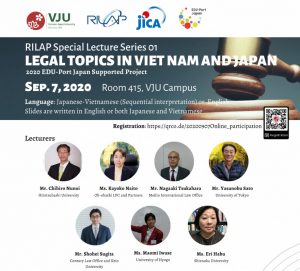About RILAP
The Research Institute of Law of the Asia-Pacific Region (RILAP) is a specified non-profit organization that brings together legal scholars attached to Japanese universities and Japanese legal professionals to conduct surveys and education in law in the Asia-Pacific region.
Established as a corporate body in August 2018 but with over 10 years of experience as a voluntary association, RILAP conducts surveys and education in law mainly in Vietnam and Cambodia.
Selected as 2020 EDU-Port Japan Supported Project
RILAP applied for selection as an EDU-Port Project with the aim of enhancing the sustainability of its activities and it was selected as a 2020 EDU-Port Supported Project.
At the time of selection, the project focused on dispatching experts to educational institutions in Vietnam and other countries, and providing legal education programs at those institutions, which is one of RILAP’s core activities. At the implementation stage, however, due to international travel difficulties caused by the COVID-19 pandemic, in FY2020 instead of actually visiting Vietnam and providing face-to-face lessons as before, RILAP provided online lectures.

(Flier for Online Lecture)
First Online Lecture
In FY2020, lectures were delivered remotely on September 7, 2020 and March 5, 2021.
As this was the first time for RILAP to deliver online lectures, we did not have a concrete image of the advantages and disadvantages. In the end, however, the lecture was attended by over 100 participants, including a number of participants from Japan as an unexpected bonus.
A key takeaway from the first lecture, on the other hand, was the realization that the participants’ online attention span was shorter than the actual lecture, necessitating a shorter lecture period and greater consistency with the topic.

(Lecture in progress)
Second Lecture
Leveraging the feedback from the first lecture, the second lecture on March 5, 2021 was shorter and more consistent with the topic. Whereas the participants in the first lecture were mainly postgraduate students, the second lecture was attended by mostly new undergraduate students, raising the issue of how to structure the lecture content.
Based on a hypothesis among the experts who were to deliver the lecture that it would be better to include the history of the formation of Japan’s legal system, the lecture presented the development process of Japanese law while providing a comparison with Vietnam, and included industry-related laws such as basic civil law, corporate law, anti-monopoly law and labor law.
Lessons Learned
As the second lecture was attended mainly by new undergraduates, we were unsure of what kind of reaction to expect. When the lecture was actually presented, however, the students asked many questions which made us feel that the content we wanted to convey had been delivered.
Legal education in Vietnam focuses on teaching statutes expressly prescribed as text and emphasis is placed on teaching knowledge of the provisions. RILAP’s lectures aimed to convey not only the importance of knowing positive law, but the enjoyment and necessity of considering the underlying principles of legal theory.
In the actual lectures, when we explained that the present Japanese legal system is the result of the steps Japan took in developing and establishing a legal system, a student asked why, considering the process of developing Japanese law and the purpose of the system, the law appears not to be applied in certain areas even though it would seem workable. The student’s question was based on the history of Japanese law and not interpretation of the text, which was what RILAP wanted to convey. At the same time, we were able to see how Japanese law and its history is viewed from outside Japan. Many of the points raised were thought-provoking for us too.
By not just providing knowledge one-sidedly through the lectures, but getting the students to study Japan’s legal system and its history from a fresh and different perspective, the students raised points that we had failed to notice, thus providing a learning experience for us too.
Travel to Vietnam continues to be restricted in FY2021 due to the ongoing pandemic, but by leveraging these experiences, RILAP will continue its mutually highly beneficial learning activities.







